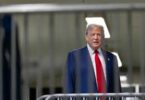Dave Lawler
WASHINGTON DC: The leaders of seven of the world’s most powerful democracies released a joint statement following their virtual summit on Friday, pledging to help low-income countries gain access to coronavirus vaccines and to “deliver a green transformation” by making environmentally conscious investments during the economic recovery.
What they’re saying: The statement released after Biden’s first international summit echoed many of his priorities, including making 2021 “a turning point for multilateralism.”
Flashback: Multiple gatherings of the G7 and similar groups ended without joint statements during the Trump era, due to disagreements over issues like climate change and, in one instance, Trump’s insistence that the coronavirus be labeled the “Wuhan virus.”
The most tangible commitments from the G7 leaders came in the form of donations to the global COVAX vaccine initiative.
The U.S. announced a total of $4 billion in contributions ahead of the summit, though the White House said it would not be donating doses along with dollars in the near-term.
The leaders also committed to keeping the taps flowing in terms of economic stimulus, to “protect jobs and support a strong, sustainable, balanced and inclusive recovery.”
Between the lines: One of Biden’s top foreign policy priorities — bringing democratic allies together to compete with China — didn’t feature explicitly in the statement from the G7, which includes Canada, France, Germany, Italy, Japan, the U.K. and the U.S., along with the EU.
But the leaders did vow to “champion open econ-omies and societies” and “consult with each other on collective approaches to address non-market oriented policies and practices.”
More from the statement:
“We will… strive to reach a consensus-based solution on international taxation by mid-2021 within the framework of the OECD.”
The leaders also committed to reform the World Trade Organization to promote a “modernized, freer and fairer rules-based multilateral trading system.”
In what appears to be a political gift to Japanese Prime Minister Yoshihide Suga, they offered support for Japan’s commitment to hold the Tokyo Olympics this year.
Worth noting: The summit also revealed that world leaders are struggling with the same challenges as the general public in the Zoom era. Contending with background noise during his introductory remarks, U.K. Prime Minister Boris Johnson had to ask German Chancellor Angela Merkel to mute her microphone.
What’s next: The leaders aim to meet in person in the U.K. in June.






